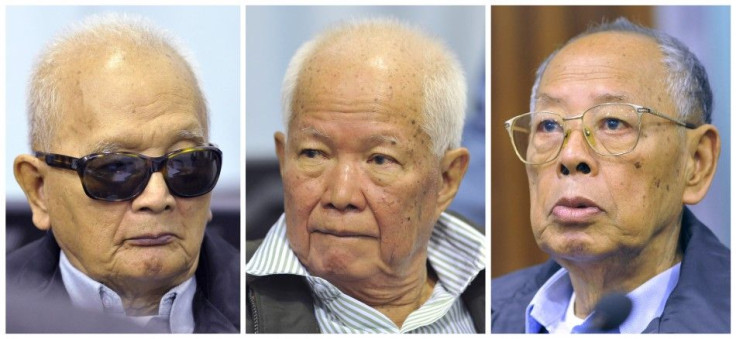Khmer Rouge Tribunal: We Are Not 'Bad People,' Former No. 2 Says

Pol Pot's right-hand man, Nuon Chea, the No. 2 leader of the brutal Khmer Rouge regime, under whom an estimated 1.7 million Cambodians were killed in the 1970s, on Monday told a court his regime were not bad people, denying responsibility for the deaths, instead placing the blame on Vietnam.
Nuon Chea's statements came as the United Nations-backed tribunal saw the first day of evidence in the trial of three former leaders of the Communist movement that ruled the Southeast Asian state between 1975 and 1979.
I don't want the next generation to misunderstand history. I don't want them to believe the Khmer Rouge is bad people, are criminal. Nothing is true about that, the 85-year-old Nuon Chea said.
Nuon Chea and two other Khmer Rouge leaders are accused of crimes against humanity, genocide, religious persecution, homicide and torture. All have denied wrongdoing.
These war crimes and crimes against humanity were not committed by the Cambodian people, Nuon Chea said. It was the Vietnamese who killed Cambodians.
The regime was eventually ousted from the capital by Vietnamese forces. Vietnam, which shares a border with Cambodia, sponsored a resistance movement and invaded, toppling the Khmer Rouge in 1979.
The central focus of this week's court hearings is expected to be largely on the charges involving the forced movement of people and crimes against humanity, the Washington Post reported. After the Khmer Rouge captured Phnom Penh on April 1, 1975, they began displacing an estimated 1 million people - even hospital patients - from the capital into the countryside; in an attempt to create a Communist agrarian utopia.
When asked by a judge about the background of the Khmer Rouge party, Nuon Chea said it had been set up to liberate the country from the rich and powerful.
After Nuon Chea twice asked the court to adjourn early due to heart problems and breathlessness, the judge adjourned proceedings until Tuesday. There is some concern that the accused could pass away before justice is delivered. The other defendants are 80-year-old former head of state Khieu Samphan and 86-year-old former foreign minister Ieng Sary.
Pol Pot died in 1998 in Cambodia's jungles; a fourth defendant, 79-year-old Ieng Thirith, was ruled unfit to stand trial because she suffers from Alzheimer's disease. She is Ieng Sary's wife and she was the regime's minister for social affairs.
The Khmer Rouge criminal tribunal was established in 2006 by a treaty between the United Nations and Cambodia; it is seeking justice on behalf of the estimated quarter of Cambodia's population who died from executions, starvation, disease and overwork under the Khmer Rouge.
This is the first time the accused person will be asked questions in a public hearing about their role in the events that led to the takeover of Phnom Penh on 17 April 1975 and about the policies of the Khmer Rouge, tribunal spokesman Lars Olsen told The Associated Press.
© Copyright IBTimes 2025. All rights reserved.





















